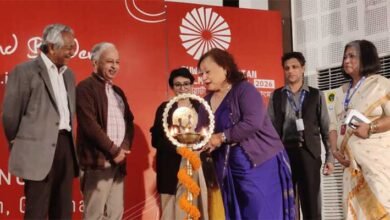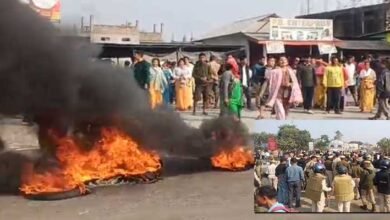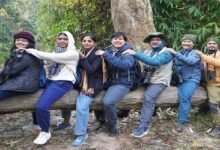Assam: CAA gave birth to AAIRA, to know why… read this article
AAIRA, is a non political organization formed by few young lawyers with the sole purpose to sensitize the people of Assam about the CAA 2019

AAIRA, is a non political organization formed by few young lawyers with the sole purpose to sensitize the people of Assam about the CAA 2019 and the case pending before the Supreme Court in a proper manner.
When the CAB came into force as an Act, many organizations, individuals from Assam and across the country knocked the doors of the Supreme Court questioning the validity of the CAA. But when the matter was initially taken up, it was observed that the peculiar situation of Assam and the consequences in respect of Assam were not properly placed before the Court. Even Assam’s cases were clubbed with the petitions filed by the other States. Moreover, the observations of the Court were interpreted in a distorted manner.
In such circumstances, AAIRA was formed with the sole purpose to represent the cause and case of the State of Assam before the Supreme Court in a proper manner. It was felt by our association that if the case of Assam is not separated then the consequence of the same would be fatal on Assam, said Advocate Amit Goel, treasurer, AAIRA.
Subsequently, AAIRA approached Vikash Singh Sr. Advocate to represent our case before the Supreme Court. Vikash Singh being sympathetic to our cause consented to represent AAIRA before the Suprme Court. And on 22.01.2020, considering the bold arguments advanced by Vikash Singh the SC was pleased to segregate and hear the case of Assam and Tripura separately, said Amit.
Advocates’ Association for Indigenous Rights of Assamese” (AAIRA) which is formed to solely stand for protecting the rights of Assamese approached Supreme Court challenging the Constitutional validity of “Citizenship Amendment Act” in short “CAA” and the notification dated 10.01.2020 giving effect to the said Act.
CAA is the most burning topic in the entire India. People are showing their dissatisfaction against the Act almost from every corner of the Country. Whereas anger and dissatisfaction in rest of the Country is mainly due to selective and conspicuous inclusion of few religious communities from selected countries which alters Secular fabric of our Nation as well as our Constitution; but the issue pertaining to Assam is completely different, where the people are more concerned about their identity and existence as Assamese, since the illegal immigrants from Bangladesh will outnumber them if the Act is brought into force and citizenship is granted to these illegal immigrants.
As known to all, who is concerned about the present state of affairs, that “CAA” is under challenge before the Supreme Court. However public awareness about the same is very minimal. In fact, there are several legal issues regarding the consequences and adverse affects of the “CAA” which are yet to be clarified to the general mass, Moreover it also cannot be denied that this legal battle is becoming an instrument for political benefits for few.feels AAIRA’s advocates.

Apparently it is seen that some misinformation is being circulated regarding the status of the ongoing cases pending before the Supreme Court. This has diverted the spirit of the democratic protest in Assam and also has diluted the specific stand of the Assamese people against “CAA” in the national platform. As such, being members of the legal fraternity, a conscious initiative was taken by young lawyers from Assam to form a Society, namely, “Advocates’ Association for Indigenous Rights of Assamese” (AAIRA) which will solely stand for protecting the rights of Assamese by continuing its legal battle in the Supreme Court. AAIRA will also provide authentic information about the ongoing legal proceedings and provide uptodate legal information to the common people, so as to provide appropriate guidance and rightful direction for peaceful democratic protest of the public, informed Advocate Amit.
Large scale illegal immigration from Bangladesh over several decades has been altering the demographic complexion of the State of Assam. It poses a grave threat both to the identity of the Assamese people as well as to national security. No other state has ever faced such illegal immigration which Assam has been facing since independence. Today, by bringing “CAA”, the Government has confirmed the extinction of the Assamese in their homeland.
The “CAA” has changed the definition of illegal immigrant by adding a proviso to it and accordingly,any person belonging to Hindu, Sikh, Buddhist, Jain, Parsi or Christian community from Afghanistan, Bangladesh or Pakistan, who entered into India on or before the 31st day of December, 2014 and who has been exempted by the Central Government by or under clause (c) of sub-section (2) of section 3 of the Passport (Entry into India) Act, 1920 or from the application of the provisions of the Foreigners Act, 1946 or any rule or order made there under, shall not be treated as illegal migrant for the purposes of this Act.
Any of the above mentioned people who are no longer illegal immigrants because of enactment of “CAA” can now apply for citizenship, immediately after 5 years of their residence in any part of India and they will be treated as citizens of India from the date their entry into India.

The “CAA” however excluded the tribal areas of Assam, Meghalaya, Mizoram or Tripura as included in the Sixth Schedule to the Constitution and the area covered under “The Inner Line” notified under the Bengal Eastern Frontier Regulation, 1873 (ArunachaL Pradesh, Nagaland, Mizoram and now Manipur) from its application.
In the Passport (Entry into India) Act, 1920 and in Foreigners Act, 1946 the Government on 7.9.2015 made 2 (two) amendments in their respective Rules and thereby allowed persons belonging to minority communities in Afghanistan, Bangladesh and Pakistan, namely, Hindus, Sikhs, Buddhists, Jains, Parsis and Christians who were compelled to seek shelter in India due to religious persecution or fear of religious persecution and entered into India on or before the 31st December, 2014 to enter into India. Most interestingly, these persons need not have any passport or any valid travel documents which implies that any person without any clear identity, can take shelter in India merely by making a false statement.
A reading of all the above legal provisions gives the following conclusions with respect to Assam:
- Any person from Bangladesh can illegally enter into Assam without any passport or any other travel document and will just need to make a statement that he/she had been religiously persecuted and has entered prior to 31st Dec 2014. As such there will be no requirement to verify the person’s identity and the date of his/her entry into India.
- That person who illegally entered into India will no longer be an illegal immigrant, now because of enactment of “CAA”.
- That person can now apply for Citizenship as the aforesaid period of 5 years will get over on 31st Dec 2019 even for the last person who claims to have entered India exactly on 31st Dec 2014.
- Due to exclusion of the Sixth Schedule Areas and the Inner Line Permit Areas, all the illegal Bangladeshi immigrants, who are taking shelter in aforesaid exempted areas will apply for citizenship from any favourable location in a nearby state/districts where they can show their residence to apply for citizenship. Because of the above the State of Assam will be worst sufferer considering its strategic location.
- The conferment of Citizenship to these illegal Bangladeshi immigrants will infringe upon the rights of indigenous people over their resources, employment, economy, language, culture, ethnicity etc.. Most importantly they will have a right to Vote and contest election, which will give them enormous political powers to determine the fate of the Assamese People and the day is not far when any such illegal immigrant will rule the Assamese People.
AAIRA, in its petition, by placing the fatal consequences on Assam because of the amendment, questions the Constitutional validity of the same on the ground of violating Article 14, 21, 29(1), 325, 326, 355 of the Constitution. The petition also deals in details about violation of Assam Accord, Section 6a of the Citizenship Act and other judicial pronouncement of the Supreme Court.









